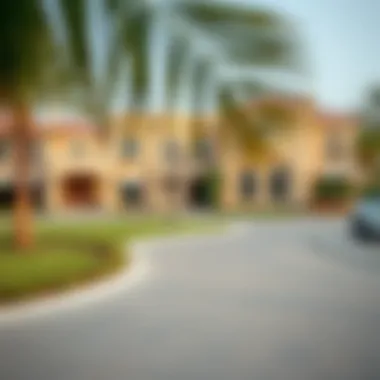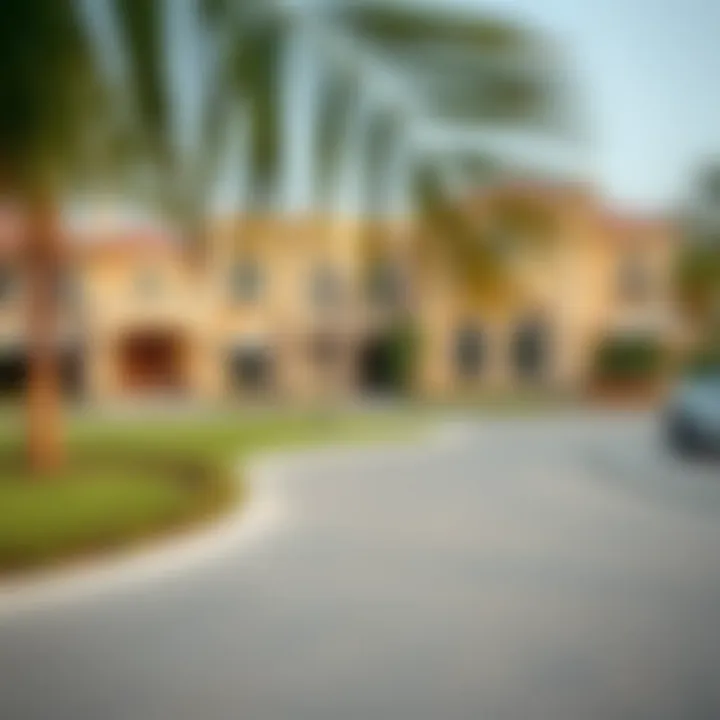Emirates Estate: Your Guide to Dubai Real Estate Market


Intro
Navigating the real estate market in Dubai can feel like trying to find your way out of a maze. With its booming economy, ever-evolving skyline, and diverse array of properties, the Dubai real estate scene offers both challenges and opportunities. For potential buyers and investors, understanding the specifics of Emirates Estate can be the key to unlocking the full potential of this market. This guide seeks to shed light on the various facets of purchasing and investing in real estate within this dynamic enclave.
We'll explore the current market trends shaping the landscape, examining both residential and commercial properties. This will be complemented by insights into financing options, neighborhood characteristics, and the key regulatory considerations that one must navigate. Ultimately, this comprehensive guide aims to equip investors, homebuyers, agents, analysts, and developers with the knowledge they need to make informed decisions in the Emirates Estate sector.
Emirates Estate Overview
Understanding the Emirates Estate landscape is crucial for anyone looking into Dubai's real estate market. This area serves as a microcosm of the broader shifts, opportunities, and challenges within the city’s dynamic property sector. Investors, homebuyers, agents, and developers alike can benefit from a thorough grasp of Emirates Estate, as it not only showcases the current trends but also reflects the historical context and future potential of the market.
Analyzing Emirate Estate offers insight into its vibrant community and the potential for growth and development. The nuances present in this area may dictate larger market movements, making it an essential focus for all stakeholders in real estate.
Historical Context
To appreciate the present state of Emirates Estate, one must first look to its past. Initially established as a residential zone in the early 2000s, it has blossomed into a prominent district characterized by luxury and modern living. The region has witnessed unprecedented growth, spurred by Dubai's overall economic development and the influx of foreign investment. The strategic location near key commercial centers has also contributed to its appeal.
The property landscape transitioned significantly over the years, with milestones such as the completion of the Emirates Tower and the construction of various high-rise buildings. Over time, these developments have not only enhanced the skyline but also attracted a diverse population, further enriching the local culture and community.
Current Market Trends
Currently, Emirates Estate is observing some interesting trends within the property market. Prices for both residential and commercial properties are subject to fluctuations, heavily influenced by global economic conditions and local economic policies. Reports indicate a stabilizing trend in property prices, with analysts suggesting that the market is shifting towards a buyer's favor, especially in the wake of recent economic policies aimed at boosting investment.
Rental yields in Emirates Estate remain competitive, making it an attractive option for investors. The demand for residential properties continues to rise, fueled by expats seeking long-term and short-term living arrangements. Moreover, unique amenities and lifestyle offerings in the area are promoting a vibrant community spirit.
"The property market in Emirates Estate showcases the resilience and adaptability of Dubai's real estate, reflecting both historical depth and modern demands."
Key Landmarks and Developments
Emirates Estate is peppered with several key landmarks that define its character. Notable developments such as the Dubai Marina Mall and the Dubai Aquarium are major attractions for residents and tourists alike. These landmarks are not just visually striking; they serve to enhance property values and contribute to the overall desirability of the community.
Recent developments also include mixed-use facilities that combine residential, retail, and leisure spaces. This trend towards holistic living spaces signifies the emirate's commitment to creating a community-centric environment. Potential buyers should take special note of sites in development, as these often signal growth potential and investment opportunities.
Types of Properties in Emirates Estate
Understanding the types of properties available in Emirates Estate is crucial for anyone looking to navigate the Dubai real estate landscape. The area boasts a diverse mix of residential and commercial properties, catering to different lifestyles, needs, and investment goals. By examining these property types, potential buyers not only confirm their preferences but also grasp the market's varying dynamics. Each type offers unique benefits and considerations that can significantly influence a buyer's decision.
Residential Properties
Villas
Villas are a prominent feature in Emirates Estate, drawing attention for their spacious layouts and luxurious living standards. Generally positioned in prime locations, these properties tend to come with significant garden areas and private pools, making them appealing for families seeking comfort and privacy.
One key characteristic of villas is their architectural diversity, showcasing various styles – from contemporary to Mediterranean influences. This variety allows buyers to find a villa that resonates with their personal taste.
A unique aspect of owning a villa is the potential for customization. Homeowners can tailor their space to fit their lifestyle completely. However, maintenance can be a heavy lift due to larger areas to care for. Thus, while villas can be a delightful investment, buyers must consider the ongoing upkeep.
Condos
Condos in Emirates Estate present a modern alternative to traditional housing. They are becoming increasingly popular, particularly among young professionals and those looking for a vibrant community atmosphere. These properties often come with shared facilities like gyms, pools, and concierge services, which are enticing features for many buyers.
The key aspect of condos is their affordability compared to standalone houses. In bustling urban areas, they provide the perfect balance of luxury and practicality. However, buyers should remember that condo living means dealing with homeowners' associations and their set of rules – which can be a double-edged sword.
A notable feature of condos is their prime locations, often set within walking distance to shops, dining, and entertainment options. This connectivity makes them appealing to anyone who values convenience.
Apartments


Apartments cater to those seeking budget-friendly yet stylish living options within Emirates Estate. This property type ranges from studios to multi-bedroom units and appeals to both investors and long-term renters.
What makes apartments attractive is their flexibility. Whether for personal use, rentals, or a combination of both, buyers have versatility in how they can utilize their investment.
Additionally, many apartments are designed with modern amenities that enhance the living experience. However, potential buyers may need to contend with the complexities of lease terms if looking at rental investments. Furthermore, space can be limited, making them less ideal for larger families.
Commercial Properties
Office Spaces
The demand for office spaces in Emirates Estate reflects the city's growing business environment. Many of these spaces are designed with technology in mind, making them a strong choice for modern enterprises looking to set up shop.
Office spaces often boast features like open-plan designs and high-tech utilities. This makes them ideal for startups and established businesses alike. However, the cost per square foot can be higher in prime areas, prompting a detailed cost-benefit analysis for potential tenants or buyers.
Retail Units
Retail units in Emirates Estate thrive on the area’s robust foot traffic. These commercial properties are designed for various businesses, from boutique shops to franchises. The appeal of retail units lies in their visibility and accessibility, crucial for any successful business venture.
Investing in retail units can be lucrative due to the continuous demand for physical shopping spaces, but buyers must be mindful of changing consumer behaviors, especially as online shopping evolves.
Mixed-Use Developments
Mixed-use developments are a growing trend in Emirates Estate, blending residential, commercial, and leisure spaces all into one set-up. This innovative concept is designed to create community-focused environments where living and working coexist seamlessly.
The hallmark of mixed-use developments is their convenience. With homes, shops, and offices in close proximity, the live-work-play model offers a lifestyle that appeals to many. However, new developments can sometimes face lengthy permit processes or community pushback, factors that potential investors ought to consider.
"As Dubai continues to evolve, the appeal of mixed-use developments attracts a diverse demographic, all eager for a dynamic lifestyle."
Investment Opportunities
Investing in real estate has long been regarded as a reliable wealth-building strategy, and Dubai offers a particularly appealing landscape for both novice and seasoned investors. The combination of a booming economy, a diverse mix of developments, and a favorable regulatory environment makes the Emirates Estate a hotbed for investment opportunities. Understanding the nuances of the local market is crucial for maximizing returns and minimizing risks.
Benefits of Investing in Dubai
Dubai’s real estate market is characterized by several key advantages. Firstly, there’s the potential for high rental yields. Many areas in Dubai yield returns that can exceed even the most buoyant global real estate markets. For instance, with the rise in tourism and an increase in expatriate population, demand for residential and commercial properties remains robust.
Secondly, the absence of property taxes on residential properties adds to the appeal. Investors only need to account for service charges and maintenance fees, which makes the net proceeds from rental income more generous than those seen in other major cities like London or New York.
Furthermore, there is a stable political environment, bolstered by the country's strategic initiatives aimed at diversification and sustainability. This fosters long-term confidence among investors, reassuring them that their investments are less likely to be adversely affected by sudden policy shifts.
Identifying Profitable Areas
Delving deeper into the investment potential, zoning in on lucrative neighborhoods is essential. Not all areas of Dubai yield equal returns on investment; thus, understanding the dynamics of both emerging and established neighborhoods can aid in making informed decisions.
Emerging Neighborhoods
Emerging neighborhoods hold promise for high appreciation potential. These areas, often on the periphery of central locations, are increasingly becoming attractive for investors looking for good deals. For example, districts like Dubailand and Dubai South are catching the eye of savvy investors. The key characteristic of these emerging areas is their ongoing development projects and government backing.
With infrastructure improvements, public transportation connections, and recreational facilities, they boast a unique appeal that often leads to rapid price appreciation over a few years. Nevertheless, it’s essential to consider the challenges too. Such neighborhoods may lack some of the amenities or conveniences that seasoned residents might expect, and investors should assess whether the initial lower prices justify these trade-offs.
Established Areas
In contrast, established areas such as Downtown Dubai and Dubai Marina have long been staples in an investor's portfolio. Their primary characteristic is a proven track record of strong demand and robust infrastructure. With iconic landmarks like the Burj Khalifa and expansive waterfront views, these areas command premium prices and excellent rental yields.
One unique feature of established neighborhoods is their resilience to market fluctuations. Historically, they maintain value better than emerging neighborhoods, making them less risky for conservative investors. However, the disadvantages might include higher entry costs, leading to a potentially prolonged return period before seeing profit.
Ultimately, the choice between investing in emerging versus established areas depends on the investor's strategy and risk tolerance. Whether you lean towards the high-risk, high-reward allure of emerging neighborhoods or prefer the safety of time-tested established areas, the important thing is to do thorough research and keep your ear to the ground regarding Dubai's evolving real estate landscape.


"Investing in the right location at the right time is the key to making money in real estate."
In summary, Dubai’s real estate market gels well with myriad investment opportunities, and with diligent research and strategic planning, investors can navigate this vibrant landscape successfully.
Financing Options for Buyers
In the throbbing heart of Dubai's real estate market, understanding financing options can be a game changer. This aspect is paramount for any potential buyer looking to navigate the sometimes murky waters of property acquisition. Engaging with diverse financing options allows buyers to assess what aligns best with their financial strategies, thus making informed decisions that can significantly impact their investment's performance.
When you're eyeing properties in Emirates Estate, the financial backing you choose can influence your budget and, ultimately, the kind of property you can afford. Let's dive a little deeper into two predominant financing avenues that buyers often consider.
Mortgage Options
Securing a mortgage is often the most popular choice for home buyers in Dubai. It allows individuals to purchase property without needing the full amount upfront. There are a few key points to keep in mind when considering mortgages in Dubai:
- Types of Mortgages: The common types of mortgages available include fixed-rate, where the interest rate stays the same throughout the loan term, and adjustable-rate mortgages, where rates can fluctuate. Each type has its pros and cons depending on your financial situation.
- Down Payment Requirements: Generally, non-Emirati buyers need to put down a minimum of 25% of the property's value, while UAE nationals can secure properties with as little as 20% down. These distinctions are crucial, as they could alter your upfront costs significantly.
- Term Lengths: Mortgages in Dubai typically range from 15 to 30 years. A longer term can lower your monthly payments but may result in higher total interest paid over time.
Understanding these elements can empower you, ensuring that when you step into the bank's office to seal the deal, you are armed with knowledge. With banks like Emirates NBD and Abu Dhabi Commercial Bank offering tailored options, it's essential to shop around to find the best fit for your specific situation.
Government Financing Schemes
Besides traditional mortgages, Dubai's government has initiated several financing schemes aimed at facilitating property ownership for both residents and overseas buyers. A few notable options include:
- The Sheikh Mohammed Bin Rashid Housing Establishment: This scheme aids Emiratis in obtaining homes with lower interest rates and extended repayment periods.
- Developer Financing Schemes: Often provided at the purchase stage, these options allow buyers to make payments on the house during construction, lessening the financial burden.
- First-Time Buyer Programs: Dubai also promotes various plans targeting first-time buyers, which may offer favorable terms or reduced fees.
By leveraging these government schemes, potential investors can significantly ease the financial strain of purchasing property.
In summary, understanding and choosing the right financing option is critical in the dynamic Dubai real estate arena. As buyers evaluate their needs, they should consider consulting with financial advisors or real estate experts for deeper insights tailored to their unique situations. Every dirham saved can enhance the overall investment potential.
"Every coin has two sides. When investing, understanding the financing side is just as crucial as the property side."
Regulatory Framework in Dubai Real Estate
Understanding the regulatory framework of Dubai's real estate realm is essential for anyone looking to navigate this labyrinth of opportunities and constraints. The laws in place not only protect the buyers and investors but also ensure the transparency and reliability of the market. With the rapid growth and development of the city, clear regulations have been put in place to maintain order and encourage investment.
Property Ownership Laws
The laws governing property ownership in Dubai are intricate and designed to cater to both local and international investors. One of the key features of these laws is the distinction between freehold and leasehold ownership.
- Freehold Ownership: This allows investors, regardless of their nationality, to own property outright in certain specified areas designated as freehold zones. Some notable areas include Dubai Marina and Palm Jumeirah. The appeal of freehold ownership lies in its permanence. Once you own a property in a freehold area, you hold the title without any renewal obligations, unlike leasehold situations.
- Leasehold Ownership: As for leasehold properties, these typically involve owning the property for a specific period, often 99 years, which can be renewed. This arrangement is more common in non-freehold areas and tends to attract local buyers and entities.
Understanding these distinctions is vital, as it can greatly affect an investor's long-term strategy. Additionally, property ownership laws encapsulate other factors, such as registration fees and regulations surrounding property use. Therefore, being well-versed in these laws can mean the difference between flourishing on the real estate scene or stumbling into a quagmire of legal troubles.
Foreign Ownership Guidelines
Foreign investors looking to dip their toes into Dubai real estate need to be aware of specific guidelines set forth by local regulatory authorities.
"Foreign ownership encourages global capital inflow, but it's critical to know your distinct rights and responsibilities."
- Eligibility Criteria: The regulations stipulate that foreign nationals can own up to 100% of a property within designated zones. However, this is often contingent upon the type of the property bought and the area it resides in. It's prudent to consult with legal advisors who understand the local landscape to ensure compliance.
- Investment Limits: Some regions may impose minimum investment requirements to qualify for full ownership, while others permit ownership but with conditions that impact how the property can be used or modified.
- Residency Benefits: Acquiring property grants certain residency benefits to foreign buyers under specific conditions, typically a residency visa tied to the purchased real estate. This is an attractive incentive for investors drawn to the lifestyle and business opportunities available in Dubai.
Before making any property investments, potential buyers should thoroughly understand these ownership guidelines. They serve to shield investors from unforeseen challenges and enhance their overall experience in Dubai's dynamic market.
Understanding these frameworks will help shape your strategy effectively. Being informed means having a clearer perspective of not just what to invest in, but how to do so responsibly and legally. For more about property ownership in Dubai, you can refer to Dubai Land Department.
In summary, the regulatory landscape in Dubai serves to bolster investor confidence and maintain a thriving real estate market. As you consider your investment strategy or home purchase, knowing the law and its implications can only serve you well.


Neighborhood Insights
Understanding the neighborhoods within Emirates Estate is crucial for anyone looking to invest or reside in Dubai. The area is a mosaic of distinct communities, each offering something unique. From the vibe of the local cafes to the aesthetics of neighborhood parks, these elements contribute significantly to livability and investment potential in the region.
Investors and homebuyers alike must recognize the value of local amenities, services, and lifestyle offerings that neighborhoods provide. The landscape is constantly shifting, and keeping a finger on the pulse can mean the difference between a good investment and a great one.
Lifestyle and Amenities
The lifestyle that Emirates Estate offers is rich and varied. Residents can choose from luxury retail outlets, artisanal food markets, or traditional souks that give a taste of local culture. Recreational amenities such as parks with pathways for jogging, children's play areas, and sports facilities contribute to a fulfilling lifestyle.
Many neighborhoods come with community-specific features, like:
- Health and Wellness: Gyms and yoga studios are plentiful, appealing to health-conscious residents.
- Dining Options: Unique cafes and restaurants serving cuisines from around the globe add a vibrant flavor.
- Cultural Hubs: Art galleries and theaters often dot neighborhoods, showcasing local talent and fostering community engagement.
Beyond mere convenience, amenities influence property values. Areas with high-quality schools and healthcare facilities usually see higher demand, making it vital for potential buyers to consider these elements when scouting neighborhoods.
Transportation and Accessibility
Transport links are the arteries of any vibrant urban area. In Emirates Estate, proximity to main roads and public transit options is a point of interest for many. A well-connected neighborhood not only enhances daily commutes but also elevates property values.
Public transportation is experiencing an expansion in Dubai, making getting around more manageable. Features to consider include:
- Metro Stations: Ease of access to the metro can drastically reduce travel time and increase the attractiveness of a property.
- Bus Services: Reliable bus networks contribute to accessibility, especially for those who don’t drive.
- Cycling Paths: In recent years, Dubai has invested in creating dedicated cycling paths, promoting a greener lifestyle.
In essence, choosing the right neighborhood in Emirates Estate, with a keen eye on lifestyle and transport options, is invaluable for both investors and homeowners. The combination of these insights can make a substantial difference in personal satisfaction, investment returns, and overall quality of life in this thriving part of Dubai.
Future Trends in Dubai Real Estate
The evolving nature of real estate in Dubai is akin to a meticulously choreographed dance, with each movement carefully influenced by local dynamics and global patterns. Understanding the future trends within Emirates Estate provides invaluable insights for homebuyers, investors, and analysts alike. With many developments and regulations on the horizon, keeping an eye on these trends can mean the difference between merely participating in the market and capitalizing on its potential.
Predicted Market Changes
In the dynamic ecosystem of Dubai's property market, predicting changes is essential for making well-informed decisions. Recent trends indicate a shift towards more sustainable and affordable housing options. With a surge in eco-friendly initiatives, future developments are likely to prioritize energy efficiency and sustainability in their design. Rental yields in areas like Dubai Marina and Downtown have been stable, but emerging neighborhoods such as Dubai Creek Harbour are showing promise with their competitive pricing and modern amenities.
The demand for more integrated living spaces that combine work, play, and leisure is also increasing. This is evident as more planned communities come to life, showcasing mixed-use spaces that cater to various lifestyles. Investors should keep a close watch on projects that harmonize residential and commercial developments. To get ahead, it might be wise to focus on pre-owned properties in growing regions where groundwork is being laid for upcoming infrastructure.
"The future presents unique opportunities for those willing to adapt and seek properties in burgeoning areas."
Impact of Global Economic Factors
The global economy inevitably exerts influence on local markets, and Dubai is no exception. Economic fluctuations, job market trends, and global events can have far-reaching effects on property values and investment potential. For instance, the current geopolitical climate can lead to increased foreign investments, as Dubai remains a hub for expatriates looking for stable ground amid uncertainty elsewhere.
Furthermore, fluctuations in oil prices can significantly influence the purchasing power of both local buyers and international investors. Although Dubai's economy is diversifying, oil remains an essential piece of the puzzle. As such, rising oil prices could bolster the local economy and enhance property investment opportunities.
The pivotal role of technology in this ever-changing landscape also can't be ignored. The rise of virtual reality property tours and blockchain technology for transactions makes buying and selling real estate smoother than ever before, attracting tech-savvy investors from around the globe. Investors must remain attuned to these global economic factors, ensuring they remain one step ahead in predicting potential market shifts within the Emirates Estate.
Closure and Recommendations
Navigating the Dubai real estate landscape, particularly the nuances of Emirates Estate, is no small feat. This section aims to crystallize the essential insights shared throughout the article and offer tailored recommendations for prospective investors and homebuyers alike. Understanding these elements is crucial for anyone looking to make a mark in this vibrant market.
Key Takeaways
Here are the main points to remember:
- Market Trends: The Dubai real estate market is robust, driven by a combination of tourism and changing buyer demographics. Staying updated on these trends is vital for making informed decisions.
- Property Types: Familiarity with various property types—residential, commercial, and mixed-use—can help buyers align their investment strategy according to their goals.
- Financing Options: Knowing the ins and outs of mortgage options and government schemes can ease the purchasing journey. Prospective buyers should explore these avenues to maximize their financial capacities.
- Regulatory Framework: Understanding the laws regarding property ownership and foreign investment is indispensable. Clarity on these regulations can save buyers from potential pitfalls.
- Neighborhood Insights: The lifestyle, amenities, and accessibility of neighborhoods directly affect property value. Therefore, thorough research into these aspects can help buyers choose wisely.
Advisory for Potential Investors
For those considering investing in Emirates Estate, it is crucial to have a clear strategy. Here are a few pointers:
- Do Your Homework: Before taking the plunge, conduct comprehensive research. Know which neighborhoods are on the rise and which are established; the nuances of each can significantly affect property value and appreciation.
- Consult Local Experts: Engage with local real estate agents who have a finger on the pulse of the market. Their insights can provide a competitive edge.
- Evaluate Your Finances: Consider your financial goals, risk tolerance, and investment timelines. This reflection will guide you in selecting the property type and location.
- Diversification is Key: Don't put all your eggs in one basket. Diversifying your investments across different property types or areas can help mitigate risks.
- Stay Updated: The dynamic nature of the real estate market means that what’s relevant today may change tomorrow. Keep an eye on market trends and economic indicators to stay ahead.
Investing in the Dubai real estate market, especially through Emirates Estate, can be rewarding if approached with thorough research and strategic planning. The opportunities are there for the taking, and with informed decisions, investors can secure a profitable stake in this thriving landscape.















